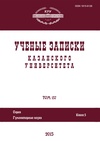Когнитивные основания названий животных в русском языке и его диалектах в общеславянском контексте
Cognitive Basis of Animal Names in the Russian Language and Its Dialects in the Common Slavic Context
Author(s): Elena Mihailovna MarkovaSubject(s): Sociolinguistics, Cognitive linguistics, Eastern Slavic Languages
Published by: Казанский (Приволжский) федеральный университет
Keywords: human cognitive action; nomination; motive; zoonyms; Slavic languages; Russian language; dialects;
Summary/Abstract: Being a form of presenting the cognitive content, any name reflects the paths of a person’s cognitive activity, the associativity of thinking, which can be described in the form of cognitive models. The paper considers the main cognitive models of animal names in Slavic languages, including the Russian language and its dialects. The basis of any nomination is a sign of the nominated object or phenomenon of reality, an image that becomes its motive in the nomination process. Using animal names, the relevance of certain characteristics of fauna in the process of cognitive and nominative human action has been demonstrated. Among the most popular motives of the nomination are such signs of animals as their color, other external signs, characteristic actions (the ability to fly, jump, crawl, dig the ground, squirm, run fast, hammer the bark of trees, etc.), feeding modes and preferences (what the animal feeds on), sounds, smell, habitat, etc. Drawing the border line between such close concepts as semantics, internal form, etymology, and word motivation, it has been emphasized that the latter has to do with the cognitive, psychological, and creative sides of the nominative human activity. Comparison with some languages of the Indo-European continuum indicates the subordination of nomination models to the unified mental processes inherent in different ethnoses. Systematization of lexemes in accordance with their motive has not only typological, but also linguo-didactic meaning: it can serve as a way of grouping vocabulary in teaching a foreign language.
Journal: Ученые записки Казанского университета. Серия Гуманитарные науки
- Issue Year: 160/2018
- Issue No: 5
- Page Range: 1193-1202
- Page Count: 10
- Language: Russian

